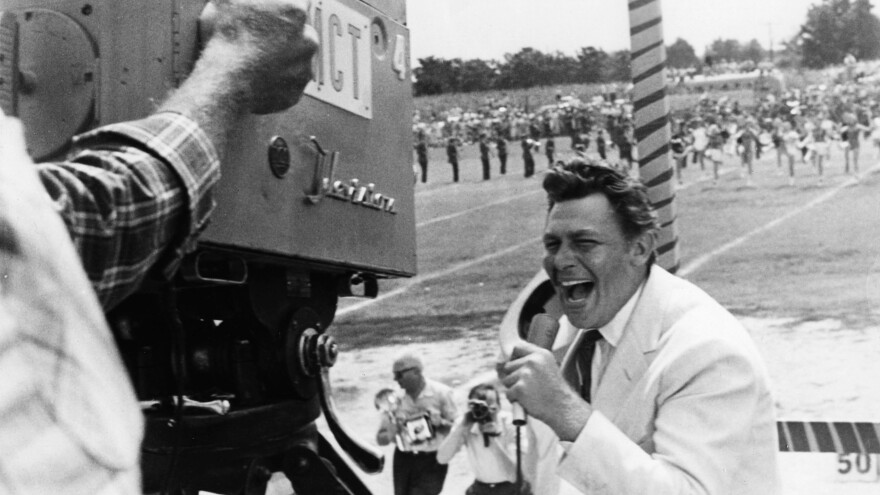We keep hearing that this election is like no other, but when I watch old movies, I often hear echoes of what's going on in the campaign.
The guy who opines in A Face in the Crowd (1957), say, that in the then-new age of television, "instead of long-winded public debates, people want capsule slogans."
Though the stellar ratings for this year's presidential debates suggest that people are actually looking for a little long-windedness these days, his thoughts on sloganeering still apply nearly six decades later — the Clinton campaign's "Let's Be Stronger Together"; the Trump campaign's "Make America Great Again."
Life imitating art? Maybe vice versa. Either way, when I hear dispatches from the campaign trail, and close my eyes, what I see are scenes from classic films.
The big one is A Face in the Crowd, in which Andy Griffith plays Lonesome Rhodes, a reality TV star pre-reality TV, and it goes to his head.
"I'm not just an entertainer," he claims, "I'm an influence, a wielder of opinion, a force."
What conjured him for me was Donald Trump's oft-repeated assertion that "People love me, and you know what, I've been very successful, everybody loves me."
Now, I cast no aspersions. To paraphrase former vice presidential candidate Lloyd Bentsen, in the movies I knew Lonesome Rhodes, Lonesome Rhodes was no friend of mine, but Donald Trump is no Lonesome Rhodes.
What Trump is, is a guy who burnished his image on TV, went on to become a "force," and then found himself in trouble when a TV microphone captured him in an unguarded moment, speaking disparagingly and occasionally obscenely about women.
A microphone left on also figures in A Face in the Crowd, with the principal difference being that Rhodes is caught on mic disrespecting not just women, but everyone. He is unaware that a flipped switch has sent the bile he is spewing out to the very public he is disparaging as "a lot of trained seals."
"I toss 'em a dead fish," he goes on, "and they flap their flippers."
Needless to say, this does not go over well. But note that he is being pilloried more for human failings than for making a political mistake. For the first time in ages, my election-year thoughts are not filled with campaign satires like Wag the Dog.
The real campaign this year has so outstripped anything Hollywood considered believable in an election movie that you have to turn to other genres for comparisons. Still, the apolitical films dovetail pretty neatly with this campaign, or at least, with the negatives in it.

For instance, while A Face in the Crowd is a perfect film for the anti-Trump crowd, if you agree with the Republican nominee that Hillary Clinton ought to be locked up, the film to catch is The Lion in Winter, where you can see how the locking-up thing plays out.
The year is 1183, and Peter O'Toole's King Henry II is allowing Katharine Hepburn's sharp-tongued Eleanor of Aquitaine out of jail for the first time in a decade or so. It doesn't take long for the anger to well up in her so ferociously, you can understand why he locked her away.
"I could peel you like a pear," she hisses at one point, "and God himself would call it justice."
Such a nasty woman.
Hollywood's record on glass-ceiling-breakers isn't great. There's The Devil Wears Prada, of course, and more recently the Hunger Games movies, but for decades, Hollywood insisted women be mostly decorative, not powerful.
There was always one exception: Queens were allowed to be as strong as any man. Think Elizabeth I, played by everyone from Bette Davis in The Virgin Queen to Judi Dench in Shakespeare in Love, where she startled a theater audience by pronouncing Gwyneth Paltrow's "illusion" as a woman playing a man playing a woman "remarkable." Then she notes that she knows "something about a woman playing a man's role. Yes, by God, I do know about that."
And, by God, I do know something about journalists, who have been taking quite a few hits on the campaign trail this year, both from Trump ("corrupt media, pushing completely false allegation and outright lies") and from Clinton, who has been so wary of the press that she went nine months without holding a single news conference.
As befits a town that lives and dies on publicity, Hollywood can be skeptical about reporters, too. In Ace in the Hole, Kirk Douglas claims to be "a pretty good liar" and establishes that he is less concerned with truth than with how a story plays. He orchestrates a whole media circus around a guy trapped in a mine.
If you believe that the search for juicier stories has contributed to making a mess of this year's election, I'm guessing you might see a parallel or two as he offers to build up a corrupt sheriff. He'll push him so hard, he says, that when the election rolls around, "the guys running against you will vote for you."
All of which is to say that the media think they can control a story, celebrities think they can control their fans, and politicians think they can control the world.
The Greeks called this "hubris," and in drama — as you'll see if you check out any of these films — it rarely ends happily.
In life? Well, we'll find out two weeks from today.
Copyright 2021 NPR. To see more, visit https://www.npr.org.









